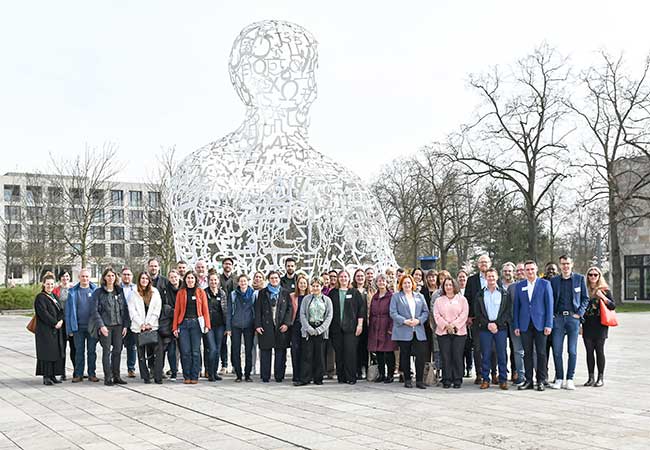The International Career Service Rhine-Main (ICS RM) is committed to supporting the professional development of students with a migrant background with a view towards promoting their successful entry into the world of work, and helping to close the skills gap in the Rhine-Main region. With these goals in mind, six public institutions of higher learning in the region have entered into a cooperation spanning trade and industry, social economic actors, the start-up ecosystem as well as public employers and supporting organizations. The first roundtable, held on March 19, 2024, brought together 40 ICS RM stakeholders, with aim of establishing a tailor-made transition between university studies and the world of work by 2028.

Some 25,000 international and a further 25,000 German students with a migrant background are currently studying at the Rhine-Main region’s six public universities. Following their graduation, only a small proportion of these students succeed at securing academic positions in trade and industry, the social economy or with public employers. More often than not, the path to self-employment also comes with difficulties. This although forecasts by the Institute for Economics, Labour and Culture (IWAK) at Goethe University Frankfurt predict a shortage of 50,000 skilled workers with an academic degree in south Hesse alone by 2028 – a gap that these students can help to close.
To help make this a reality, a joint project has been set up in southern Hesse, whose roundtable met for the first time March 19, 2024. The International Career Service Rhein-Main network comprises six public institutions of higher learning: Goethe University Frankfurt, Frankfurt University of Applied Sciences, Darmstadt University of Applied Sciences, RheinMain University of Applied Sciences, the Technical University of Darmstadt, as well as associate member Johannes Gutenberg University Mainz. The network also includes commercial and public employers from the Rhine-Main region, representatives of the start-up ecosystem and supporting organizations, including the Federal Employment Agency, the relevant immigration authorities as well as municipal business development agencies. They have joined up with the universities to help make it easier for graduates with a migrant background to transition into the world of work, irrespective of whether this involves formal employment or support in realizing innovative start-up projects. Funding from the Hessian Ministry of Higher Education, Research, Science and the Arts, the European Social Fund and the universities themselves will help make the network a reality by 2028.
„Hessian universities are important players in helping to overcome the shortage of skilled workers,“ says Timon Gremmels, Hessian Minister of Higher Education, Research, Science and the Arts. „Now that this pilot project has been approved, we are continuing to strengthen our commitment to developing international potential and at the same time delivering a contribution to equal educational opportunities. We want to interest talent from all over the world in the Rhine-Main region and understand exactly how we can support students with a migration background even better to ensure not only their successful transition into professional life, but also their desire to remain here with us in Hesse.“
Supporting the International Career Service Rhine-Main pilot project is an advisory board made up of members from employers‘ associations, chambers, municipal umbrella organizations, the relevant state ministries’ departments, as well as the member universities’ management. The board also acts as the interface to state politics. „We are pleased to be part of this project and its contribution to overcoming the shortage of skilled workers in the Hessian economy. Our hope is that as many as possible of the foreign graduates who have studied in Hesse will choose to stay here and start their careers,“ says Dirk Pollert, Managing Director of the Federation of Hessian Business Associations [Vereinigung der hessischen Unternehmerverbände, VhU] and ICS RM advisory board member.
Assigned to the advisory board is an operationally oriented roundtable, whose kick-off meeting on March 29 brought together some 40 stakeholders from industry and business, public administration as well as institutions of higher learning. Among the topics discussed was how economic stakeholders, associations and other supporting organizations can be integrated into these services to meet the needs of both the economiy as well as students, including by developing solutions for existing challenges such as inadequate networks and contact points for graduates with a migrant background. Other obstacles for the ICS RM target group include insufficient insights into the German job market and corporate cultures as well as existing legal barriers. „Our program also comprises mentoring and targeted coaching and also features events that deal with practical issues such as future skills and starting a business,“ says Jens Blank, who heads the project coordinated by Goethe University.
In the lead-up to summer this year, the team will examine projects and measures at employers‘ associations and chambers to see how representatives from the universities‘ career services can be permanently involved. In addition, working groups will be set up to develop practical solutions for issues such as residence rights, launching start-ups, and integrating academic experts into small and medium-sized enterprises.
The pilot model of the International Career Service Rhine-Main could serve as best practice for the creation of comparable structures in central and northern Hesse by 2028, by which point ICS RM should be permanently established. „This is an important contribution, especially considering that many international students need help in successfully transitioning into the economy,“ says Christa Larsen from the Institute for Economics, Labour and Culture (IWAK) at Goethe University Frankfurt. „It is crucial for as many graduates as possible to be recruited as skilled workers for the Hessian labor market.“ In 2022, 43% of the new skilled workers entering the Hessian labor market already had an academic degree, with their numbers increasing.







